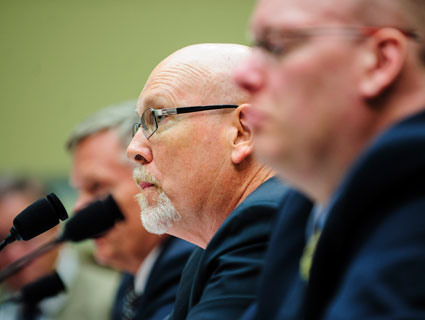I don’t want to spend too much time diving down the Benghazi rabbit hole again—seriously, I think I’d rather have my big toe cut off—but I do think it’s worthwhile to very briefly recap the three basic phases of Benghazi and what questions we have about them:
The months leading up to the attacks. Should the State Department have approved more security for both the Tripoli embassy and the Benghazi compound? Were they incompetent not to?
Quite possibly. Certainly, the State Department’s own investigation was scathing on this score (“Systemic failures and leadership and management deficiencies at senior levels…resulted in a Special Mission security posture that was inadequate for Benghazi and grossly inadequate to deal with the attack that took place”). But there was nothing new about this in yesterday’s hearing, and certainly no evidence of cover-up or scandal. At worst, it was misjudgment that reflects badly on State’s security operations. At the same
time, it’s worth keeping in mind that hindsight is always 20-20. There were also plenty of legitimate resource constraints, budget shortfalls, and deliberate policy choices that contributed to this.
The night of the attacks. Was the military response to the Benghazi attacks incompetent and chaotic? That’s possible, but like everyone else, I’ve read through the timelines and the evidence is thin. Republican investigators have continually dug up examples of things they think the military should have done (scrambled F-16s, dispatched FAST teams, etc.) and in every case the military has explained why they made the decisions they did. Gregory Hicks repeated many of these charges yesterday, and he’s obviously angry about what happened that night. But the fact that he’s angry doesn’t make him right. So far, anyway, the military’s explanations have always struck me as pretty reasonable. They certainly sound as though they understand the military realities better than Hicks and the other Monday morning quarterbacks do.
It’s also worth noting that there was simply no conceivable motive for the military not to respond forcefully to the Benghazi attacks. Maybe there was confusion and maybe there were bad decisions, but nothing more.
The months after the September 11 attacks. Did the Obama administration try to cover up what really happened in Benghazi? This is the deepest rabbit hole of all, and the conspiracy theories have flown faster and thicker than I can keep track of. But after eight months of throwing mud against the walls, nothing has stuck yet. For several days after September 11, the intelligence community said that the attacks were preceded by protests, and that turned out to be wrong. But it was just wrong, not a cover-up. The intelligence community also believed—and still does—that the attacks were essentially opportunistic, not the results of weeks or months of planning. And Susan Rice, in her Sunday interviews, infamously mentioned the role of the “Innocence of Muslims” video that had sparked the Cairo protests earlier that day, and it’s fair to say that she probably put too much emphasis on that. But only a little. There was, and maybe still is, evidence that the video played a supporting role.
And of course there are the notorious talking points, which have been subject to a deconstruction effort that would make Jacques Derrida proud. Did the interagency process sand them down a bit too much before the intelligence community released a public version? Perhaps. Were they wrong not to mention the role of Ansar al-Sharia? Perhaps. Should they have been more forthright about calling the attackers “terrorists” rather than just “extremists”? Perhaps.
But again: At most, this is evidence of misjudgment, not cover-up or scandal. And frankly, there’s not much evidence even of serious misjudgment. Nor any motive for it. The Republican theory has always been that Obama didn’t want to admit terrorist involvement because this would reflect badly on him, but this has never made any sense, either politically or practically. There’s just no there there.
Finally, we did hear one new thing yesterday: Gregory Hicks’ claim that he was demoted after he spoke with congressional investigators and questioned the State Department’s handling of the crisis. If that happened, it was wrong and Hicks is right to be angry about it. But I’d remain cautious about this. Hicks is pretty obviously bitter, but even with only his side of the story available to us, we have very little solid evidence of mistreatment. Was he asked not to speak to Rep. Jason Chaffetz (R-Utah) without a lawyer present? Probably, but that’s pretty normal. Did he do it anyway? Apparently so, and it’s not clear why. Did he get an irritated phone call about it from Hillary Clinton’s top aide? He says he did, but that wouldn’t be surprising, and we have only Hicks’ characterization of the conversation so far. Was he demoted to a desk job in retaliation? Maybe, or it could be a routine, temporary assignment while his superiors wait for something to open up for him.
We don’t have the State Department’s side of this because, of course, it’s a personnel matter and they aren’t allowed to talk about it. So I suppose we’ll have to wait on the inevitable leaks. But I’d be very cautious about swallowing Hicks’ story whole. It simply didn’t strike me as wholly credible. But we’ll see.












